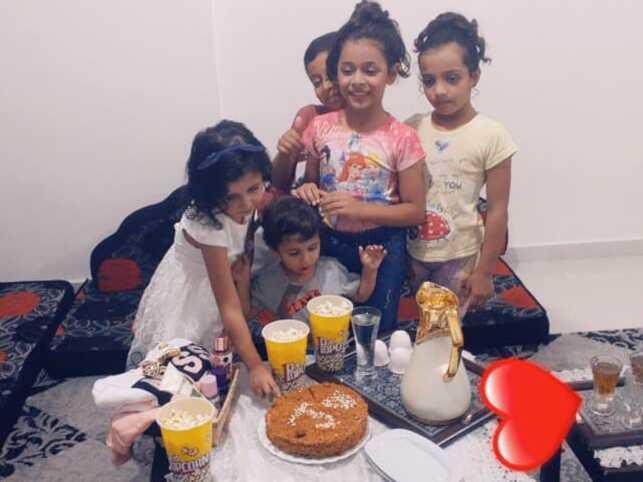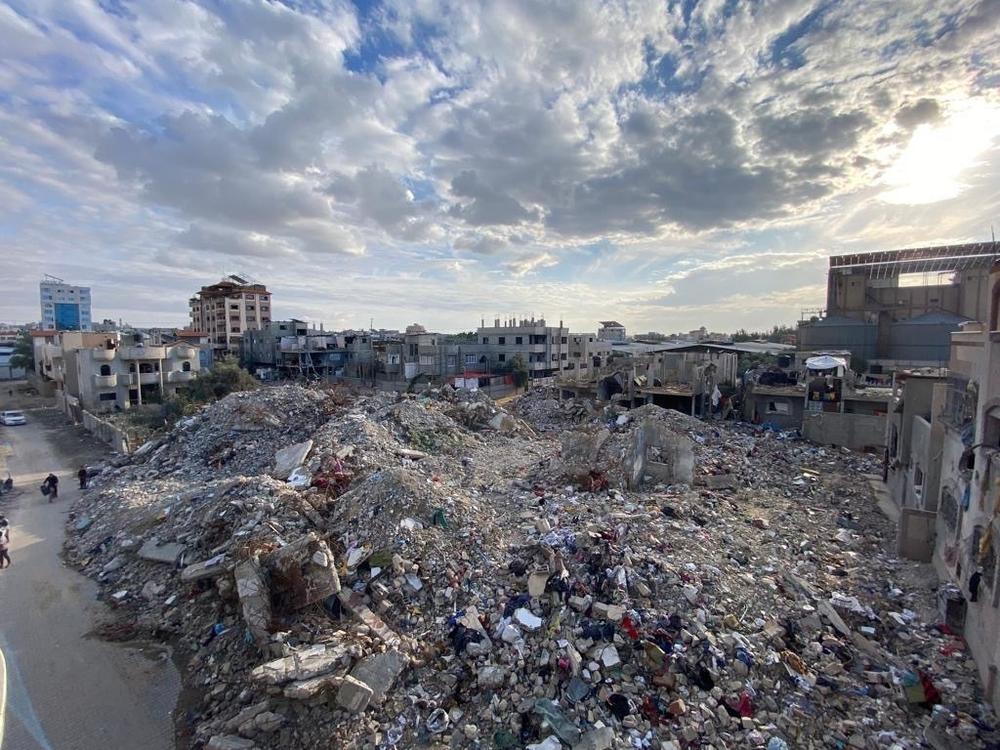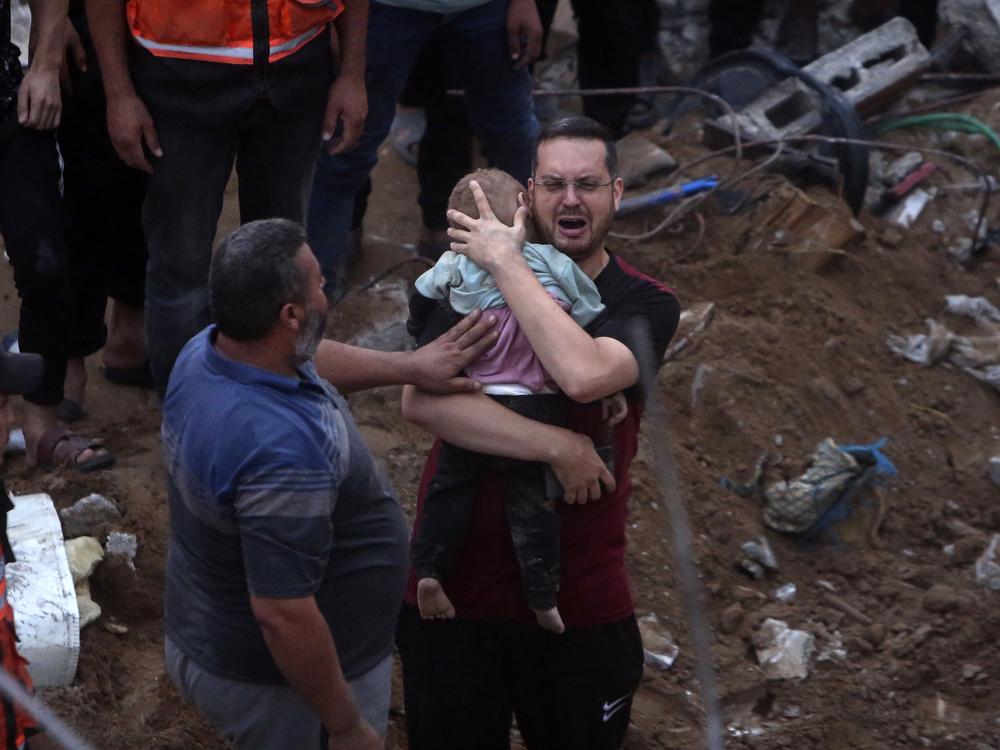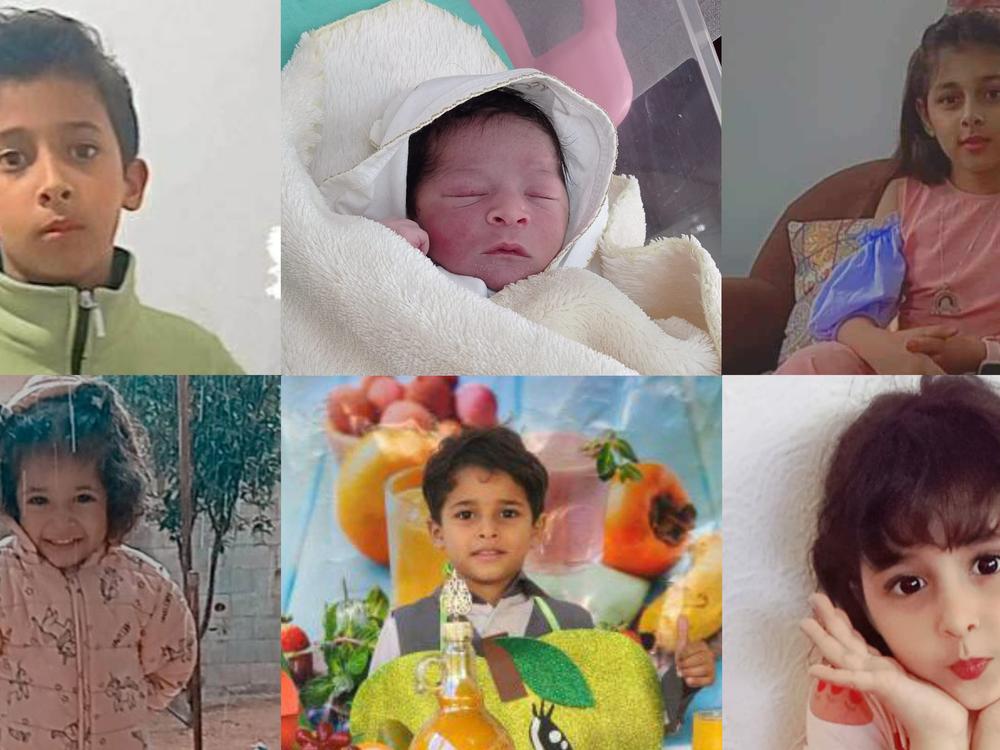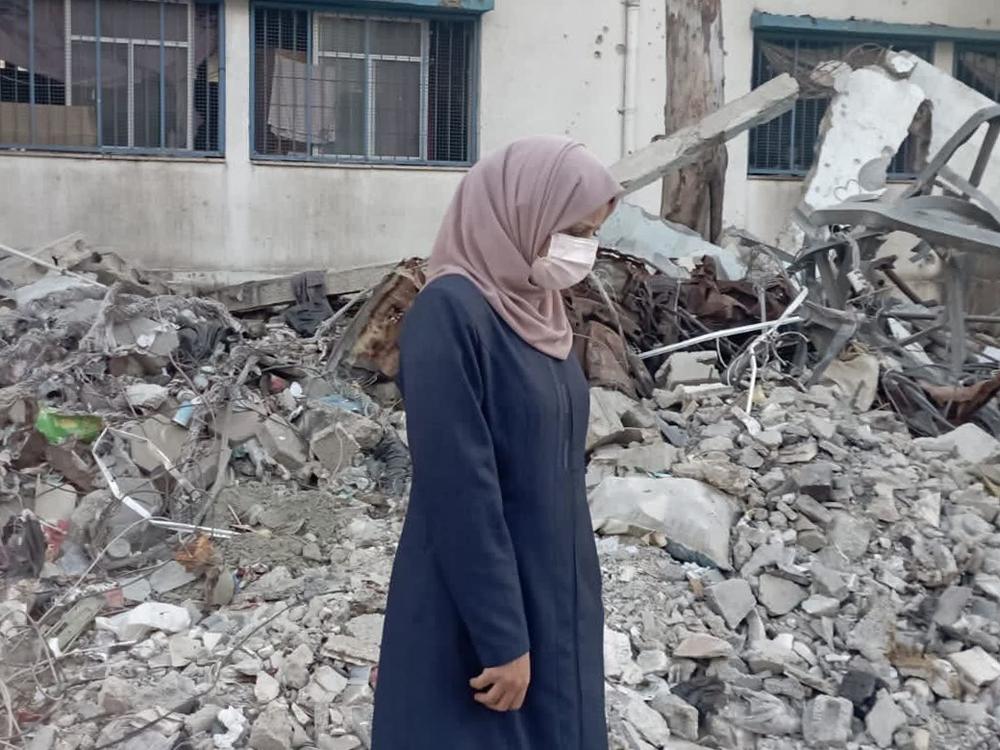Section Branding
Header Content
Her last memory is by the window with her baby in Gaza. Then, Israeli airstrikes hit
Primary Content
The skies roared with Israeli fighter jets, pummeling Gaza City with bombs that lit the night and grayed the day in dust. Eman Abusaeid, her husband and their children were jolted out of sleep, their faces covered in debris from an Israeli airstrike on their neighbor’s home.
“Many of the buildings surrounding us have been bombed by F-16s. We’re trying to escape but don’t know where to go,” she said over the phone, two days into the war.
She spoke to NPR on Oct. 9, 2023, just two days after Hamas gunmen launched a stunning ambush on Israel. The full scale of that operation would be known weeks later as Israel combed through the burnt corpses and tested their DNA: Around 1,200 people had been killed; another 250 taken hostage.
The attack shook Israel and scarred its society and sense of safety. Israel’s yearlong war and its toll on Abusaeid and her family has shattered life in Gaza and destroyed its hopes for the future.
Across Gaza, Israel’s response to the Hamas attack was punishing and immediate. Israel’s leadership vowed to wage a war unlike anything ever seen in Gaza, a small territory governed by Hamas and blockaded by Israel and Egypt.
A full siege was declared. No electricity, food or fuel would be allowed in, Israel’s defense minister said.
Abusaeid said her daughter, Joudi, 12, and son, Ziyad, 11, were scared. They had never seen life outside Gaza and had already survived four rounds of conflict between Hamas and Israel.
“It’s the simplest requirement of our kids and our people here in Gaza. They need to move freely. They need to have adequate services, water, electricity as anyone in the world,” she said.
“Is it only the right for Israel, the occupation, to defend themselves? What about the Gazans?” she said. “Who will defend them?”
Billboards and roundabouts in Gaza City, displaying photos of fighters and civilians killed in past wars with Israel, had always served as daily reminders of what Hamas has long argued is the price Palestinians are forced to pay in their struggle for liberation — a price tens of thousands would be forced to pay for with their life over the coming year of war.
A second Nakba and mass displacement
Abusaeid and her family heeded Israeli evacuation orders the second week of the war, joining more than a million Palestinians fleeing their homes and becoming displaced in what many there called a second Nakba, Arabic for "catastrophe” and a reference to the 1948 displacement of Palestinians that Israel marks as the year of its founding.
Flyers dropped from Israeli warplanes told Palestinians where to flee to, for safety. “If you care about yourself and your loved ones, head south according to our instructions,” the military said.
Abusaeid sought shelter south of Wadi Gaza, a river valley that cuts across the Palestinian territory and which Israel’s army has captured to separate the north of Gaza from the rest of the enclave.
Abusaeid huddled in her parents’ three-bedroom apartment in Nuseirat in central Gaza. The Engineers’ Building, as it’s known, had solar power, making it better off than most after Israel had cut fuel and electricity to Gaza.
Abusaeid, a 39-year-old architect who chose a career in social work, was now living in that apartment with her husband and kids, her parents, six of her siblings, nephews, nieces and other relatives. In all, 24 people, half of them children, were sheltering there.
Then, last Oct. 31 at 2:30 p.m., the Engineers’ Building was hit with four munitions in a targeted Israeli attack. The five-storey building collapsed.
Abusaeid, her husband and two children were among at least 106 people killed in the airstrike, according to an investigation by Human Rights Watch.
The Abusaeid family lost 23 people in that attack, including Eman’s brother Mahmoud, sisters Yaqeen, Aya, Niqaa and Fatima, their parents, Khaled and Ahlam, 10 other children and two other relatives.
Rescue workers digging through the rubble recovered Eman Abusaeid’s body in pieces, relatives tell NPR. Her husband and son’s bodies are among thousands across Gaza never recovered from under the rubble and who are not included in the Gaza Health Ministry’s death toll from the war, which stands at more than 42,000 people killed.
In her last message to NPR, before she was killed, Abusaeid said there were no words to describe the situation in Gaza.
“Gaza is bleeding,” she wrote.
An “apparent war crime” examined
The death toll from the attack on the Engineers’ Building is likely much higher than what Human Rights Watch could confirm, according to relatives of people killed. More than 350 people had been sheltering in the building.
The rights group says children playing soccer on the street outside were also among those killed by the airstrike. The Human Rights Watch report quotes a man who said he found his 11-year-old son who’d been playing outside lying under concrete bars in the rubble, the back of his head cracked open, his face burned and one of his legs nearly severed from his body. The boy died in the ambulance.
Israel had struck around 300 targets that day, but this wasn’t the only attack on this scale on Oct. 31. An attack in northern Gaza’s area of Jabalia grabbed headlines and raised questions about whether Israel was violating the laws of war when aerial bombardment took down several buildings in that refugee camp, killing possibly hundreds. Israel said it was targeting a Hamas commander.
Israel’s military has accused Hamas militants throughout the war of using civilian infrastructure for cover.
Human Rights Watch, however, said it found there was no military target in the Nuseirat attack, and determined the Israeli airstrike likely violated the laws of war. In its published findings, the group called it an “apparent war crime.”
“It was a targeted attack on that building. And if you attack a building where there is no military target, and you kill this number of people, it's automatically very likely a war crime,” Gerry Simpson, associate crisis and conflict director at Human Rights Watch, told NPR.
He says surveillance in the days and even hours before the attack would have shown the building packed with people, and the kids playing soccer outside.
NPR reached out to Israel’s military multiple times to ask why the building was hit. The military did not respond to NPR’s questions. Simpson said Human Rights Watch also heard nothing back.
“We received nothing and we were quite surprised because of the seriousness of this case, the clear apparent war crime that's involved because there was no apparent military target,” Simpson said. “We expected the IDF [Israeli Defense Force] to try and mount some kind of a defense, but we received just a wall of silence.”
A last memory, underneath the window
There was one survivor, though, pulled from the wreckage of the apartment where Abusaeid and her family were sheltering: Eman’s sister, Taqwa.
NPR reached the 32-year-old by phone, nearly 11 months after the attack. Over a crackling phone line from Gaza City, she said the last thing she remembers is sitting in her parents’ living room with her 4-month-old baby, Ibrahim. He was the youngest of her six children.
“I was sitting underneath the window and he was in my lap,” Taqwa Abusaeid said.
She also remembers that on the morning of Oct. 31 last year, the family was running out of food. They had some flour and made crepes with jam and chocolate for the kids.
When she came to consciousness after the attack, she found herself in Al-Shifa Hospital in Gaza City. She would be forced to limp out of the hospital in mid-November with other patients when it was raided by Israeli forces.
Those first weeks at the hospital, she would fade in and out of consciousness many times. She remembers asking the nurses and her husband, who wasn’t with her at the time of the attack, about her children: Had Ibrahim gotten any milk? Did her kids have warm clothes?
They’d assure her without much detail that all was well, but when she tried to call her sister, Eman, the phone didn’t ring.
“No one would tell me anything, or answer,” she said.
A month later she would find out the truth: That all six of her kids, her parents, and six of her siblings and their children were killed in the airstrike that she alone survived.
A wish for martyrdom
Over the phone, she described what each of her children were like.
Somaya, or Susu, as she calls her, was 12 years old and the eldest. She was “great at everything,” including English, taught herself how to swim, was beloved by her teachers and liked to draw.
Suhaib, 11, had memorized much of the Quran and had a knack for learning quickly. He was the reliable one, she said, who would run errands for her. He loved playing soccer with his friends.
Juman, 8, was a fashionista inspired by the trends of girls in South Korea. She liked hanging out with the neighbors’ kids and never needed prodding to do her homework.
Mohammed, 5, was a chatterbox and was in preschool, she said. He’d follow his older brother, Suhaib, to play soccer with the other boys in the neighborhood, even if his mom preferred he stay indoors more.
Riman, 3, would tell her stories and spoke in ways older than her age. She also helped her mom with housework. Ibrahim, born in June, was still nursing.
“My life was full. My days were full,” she said. “And I had time for myself,” she added, explaining she would surf the internet, talk to her parents and had just accepted a job to teach.
She said now her days are empty. She spoke faintly, her voice nearly at a whisper at times. She struggled to find the words to describe life now.
In Gaza City, famine-like conditions are widespread, according to experts on hunger, and people don’t have gas to cook with. They bake on firewood pulled from the rubble.
It was afternoon when Taqwa Abusaeid spoke with NPR by phone. She’d only had a cup of milk and some bread with herbs that day.
She was severely wounded in the airstrike that killed her family. Her spleen was removed and she suffered burns and injuries on her legs. There’s a constant hum in one of her ears that becomes unbearable in quiet spaces.
But it all pales next to the loss of her children.
“Everyday they’re on my mind,” she said. “Each one of them with their stories, their adventures and what they used to do. But I try to live in reality … or else when I think about them, I can’t cope.”
She lost her phone, and most of their photos and videos, in the attack.
“I don’t want to think that they’re all gone. In normal times, they were always around me, in my face. We were always together,” she said.
When people in Gaza celebrated the news in May that Hamas had agreed to a cease-fire, prematurely it would turn out, she said she distanced herself from people and wept. There was no one to celebrate with.
“We’ve stopped thinking about the future. We just think about the day,” she said.
She said several times a day she prays to be reunited with her kids, for death, or what people in Gaza call martyrdom.
“There’s no life left in Gaza,” she said. “Everything’s changed. Everything is destroyed.”

